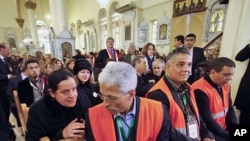A Syrian rights group says more Arab League observers are leaving the country to protest the Syrian government's deadly crackdown on a 10-month opposition uprising.
Mousab Azzawi of the British-based Syrian Observatory for Human Rights says 11 observers are expected to soon depart from Syria. He said the group of seven Iraqis, two Kuwaitis and two Emiratis had witnessed Syrian security forces firing on opposition activists Tuesday in the northeastern town of Deir el-Zour. Azzawi says 19 protesters were killed in the incident.
It was not possible to independently verify the death toll or plans by the Arab League observers to leave Syria.
An Algerian who became the first person to quit the mission earlier this week told the Reuters news agency three more observers have joined him. Anwar Malek has said he witnessed Syrian government forces committing war crimes against the Syrian people and deceiving the monitors while visiting the central city of Homs. He also has called the monitoring mission a "farce."
But a Sudanese general leading the team of more than 150 observers says Malek's accusations are untrue.
In a statement released Thursday, General Mohamed Ahmed Mustafa al-Dabi says Malek did not join the other observers in the field in Homs and instead remained in a hotel room for six days, complaining of being ill. Dabi says the Algerian asked to travel to Paris for medical treatment, but then departed Syria without waiting for approval.
The observers began operating in Syria on December 26 to check President Bashar al-Assad's compliance with an Arab League plan to end his violent suppression of the anti-government revolt. But the United Nations and the United States say killings of protesters by Syrian security forces have continued and intensified since the monitoring mission began.
The Syrian government accuses terrorists of driving the revolt and carrying out a Wednesday rocket attack that killed French television reporter Gilles Jacquier and seven other people in the central city of Homs. Jacquier is the first Western journalist to be killed in Syria since the unrest began last March.
One of Syria's main opposition groups, the Syrian National Council, blames the attack on the Syrian government. It says the killing of Jacquier shows the government not only is preventing journalists from operating freely, but also is "killing journalists" to try to silence independent media.
The United Nations estimates at least 5,000 people have been killed in the uprising, many of them peaceful protesters attacked by Syrian security forces. Others have been killed in fighting between the Syrian military and army defectors who have joined the rebellion in recent months.
Some information for this report was provided by Reuters.
| Join the conversation on our social journalism site - Middle East Voices. Follow our Middle East reports on Twitter and discuss them on our Facebook page. |

















